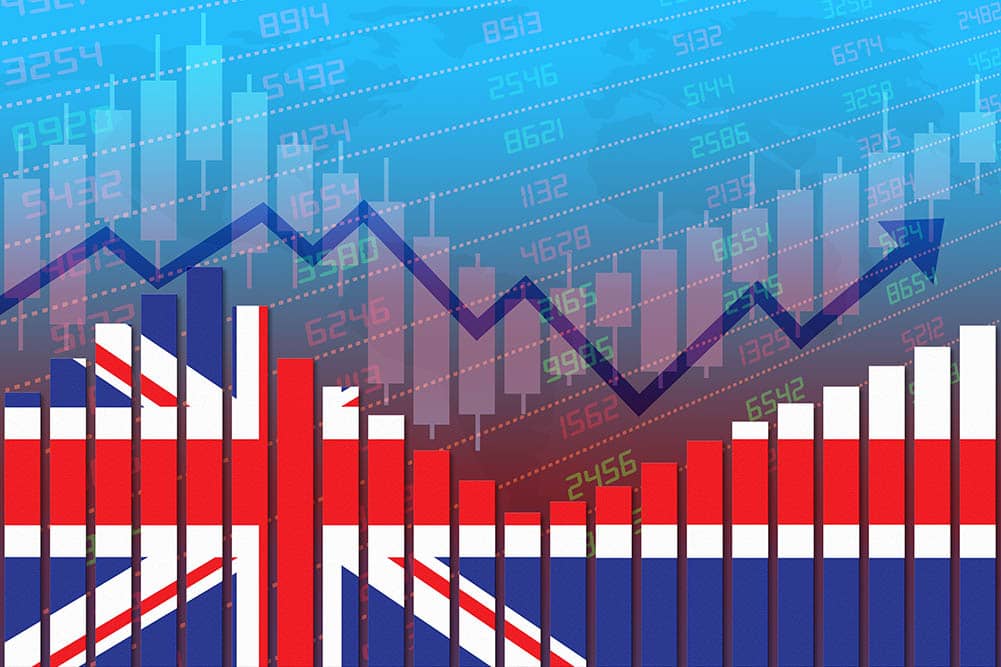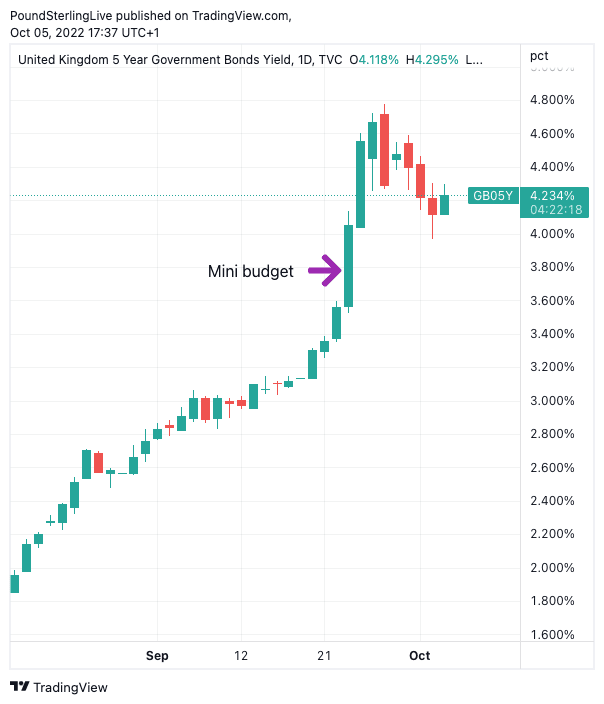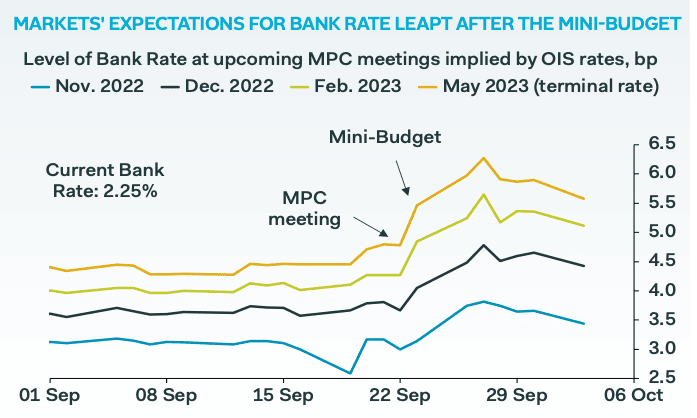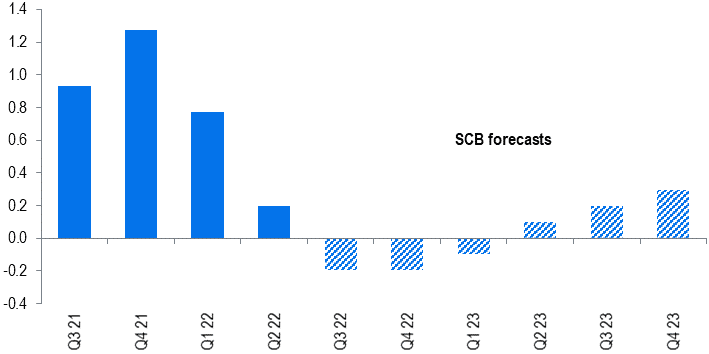Pound Sterling: Deeper Recession Now Forecast, Greater Losses seen against Euro and Dollar by Economists
- Written by: Gary Howes
The cost of living crisis meets a cost of borrowing crisis, leaving the British Pound exposed to deeper losses against the Euro and Dollar say economists.

Image © Adobe Images
Economists are lowering their forecasts for UK economic growth and say a deeper recession would mean greater losses for the Pound.
According to economists, elevated inflation means the UK economy will fall into recession, but rising interest rates owing to global factors and the market reaction to the 'mini budget' will exacerbate the scope of the downturn.
"The cost of living crisis will be exacerbated by a cost of borrowing crisis," explains Capital Economics in a new note in which they say they now expect a deeper recession than previously forecast.
Paul Dales, Chief UK Economist at Capital Economics, says he now thinks the recession will be deeper owing to the expected scale of looming interest rate rises at the Bank of England.
"If interest rates rise from 2.25% to 5.00%, as we now expect, we think the economy will suffer a deeper recession involving a 2% peak-to-trough fall in real GDP," says Dales.
Capital Economics thinks the recession will result in the unemployment rate rising from 3.6% in July to 5.5%.
"The coming recession looks set to be both deeper and longer than we expected before, reflecting the drawn-out nature of the hit to incomes from mortgage refinancing and the weaker pound," says Samuel Tombs, Chief UK Economist at Pantheon Macroeconomics.
Compare Currency Exchange Rates
Find out how much you could save on your international transfer
Estimated saving compared to high street banks:
£2,500.00
Free • No obligation • Takes 2 minutes
Tombs lays much of the blame for the new assessment at the doorstep of the new government of Liz Truss, which he says "made a hash" of its mini-budget.
The government laid out plans to cut taxes but without the oversight of the Office for Budget Responsibility (OBR), which would typically give markets a steer as to how the UK's debt sustainability will evolve.
The unfunded tax cuts followed an even bigger commitment by the government to subsidise the energy bills of households and businesses with the open-ended Energy Price Guarantee.
In short, there are no firm figures on how costly this gargantuan intervention will be because no one knows where gas prices will go, leaving markets at sea.
This has resulted in rising bond yields as investors demand greater compensation for investing in UK bonds.
Above: The yield on five-year UK government bonds.
Bond yield levels are meanwhile crucial in pricing lending instruments such as mortgages.
Tombs says current investors' expectation for the Bank of England's basic interest rate to rise to around 5.5% by next spring, from 2.25% presently implies the effective interest rate for new mortgages will increase to about 6% in Q2 2023, from 2.55% in July.
He says this will deliver a 1.6pp hit to overall real disposable incomes in 2023, and a further 0.9pp hit in 2024; that will easily outweigh the support from the government's newly announced tax cuts.
"The tightening of financial conditions is likely to be most acute in the UK housing sector, with mortgage rates already rising in line with interest rates and market activity likely to come under significant pressure," says Christopher Graham, Europe Economist at Standard Chartered.
Above image is courtesy of Pantheon Macroeconomics.
GBP to USD Transfer Savings Calculator
How much are you sending from pounds to dollars?
Your potential USD savings on this GBP transfer:
$1,702
By using specialist providers vs high street banks
But businesses will also feel the impact of rising interest rates as Pantheon Macroeconomics expects the effective rate on corporates’ bank loans also will shoot up, as 80% of the stock is floating rate.
"Some highly-leveraged businesses, therefore, look set to reduce employment, as well as investment," says Tombs.
Although the market expects the Bank of England's interest rate to rise to 5.5% Pantheon Macroeconomics says it will only get to 4%, resulting in a lower Pound.
"Our forecast for Bank Rate to peak at 4% in February implies that sterling will weaken further, boosting imported inflation. Indeed, we think that our forecast is consistent with sterling dropping to about $1.05 and €1.10 at the end of this year," says Tombs.
The Pound to Euro exchange rate is currently quoted at around 1.1450 while the Pound to Dollar exchange rate is currently around 1.13. (To better time your payment requirements, consider setting a free FX rate alert here.)
Capital Economics has been forecasting a recession involving a peak to trough fall in real GDP of 0.5-1.0% since July, but they now think real GDP will fall for five quarters in a row from Q3 2022 to Q3 of 2023 and by 2.0% in total.
This is not as severe as the recession of 2020 and that following the financial crisis of 2008 but is comparable to recessions in the mid-1970s and early 1990s.
Regarding the Pound's outlook, Capital Economics doesn't think the Pound will make a sustained rebound from the record-low of 1.05 seen against the Dollar until the second half of 2023.
(If you are looking to secure your international payment budget you could consider securing today's rate for use in the future, or set an order for your ideal rate when it is achieved, more information can be found here.)
But economists at Standard Chartered say they think the scale of government support outlined in recent weeks will preclude a more severe economic downturn in the UK.
"This includes the government's energy package, which freezes bills for households and businesses, and the recent tax cuts announced (despite the reversal of the top-rate tax cut), which could provide a modest tailwind to growth," says Standard Chartered's Graham.
Above: Quarterly change in UK GDP expected by Standard Chartered.
"Risks to our forecasts are to the downside, particularly given the precarious energy situation facing the UK over the winter period, with the prospect of ongoing energy supply disruptions resulting in potential periodic shortages.
But Standard Chartered acknowledges its updated forecasts are subject to considerable uncertainty given the potential for further policy U-turns and developments.
"We expect increasingly fragile investor and consumer confidence resulting from ongoing policy uncertainty to constrain both gross fixed capital formation and household spending over the coming quarters," says Graham.
Despite the recent upward revision to GDP growth in the second quarter (+0.2% vs. -0.1% previously), Standard Chartered now expects a recession in the UK in the second half of this year.
They lower their full-year forecast to 3.5% from 3.7% and lower their 2023 forecast to -0.1% from 0.7% previously.
Compare Currency Exchange Rates
Find out how much you could save on your international transfer
Estimated saving compared to high street banks:
£2,500.00
Free • No obligation • Takes 2 minutes







